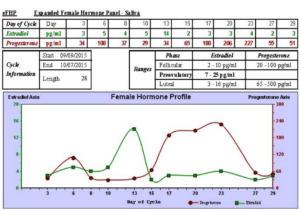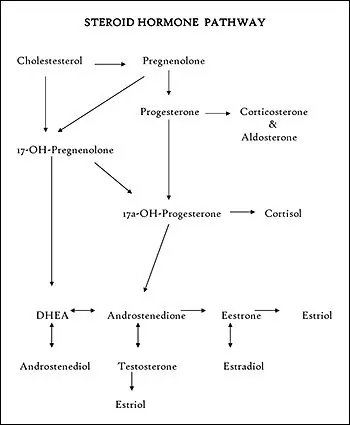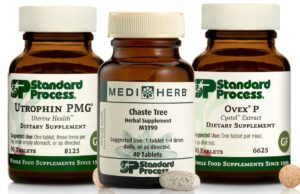By Claire Bacon, ACN, CNC
If you’re not familiar, these conditions involve an overgrowth of uterine tissue in response to imbalanced estrogen. When the overgrowth happens in the endometrial lining, it’s called endometriosis. When the overgrowth happens in the muscular wall, it’s called fibroids. Either way, it’s a huge problem. Fibroids and endometriosis can develop in women of all ages, but especially happens during perimenopause (usually in our thirties and forties, when hormones naturally start changing). If your goal is to have a healthy uterus, there are some detailed things you should know about this special hormone balance.
Both conditions can cause debilitating pain and prolonged bleeding, so bad that sometimes Advil isn’t enough. Having intense pain like this can disrupt your work and social life, cause a lot of worry in your marriage – you know, you may not have someone to talk to who really understands. And if left untreated, it eventually can cause anemia and crushing fatigue.
The typical Medical solution is laparoscopic surgery or a uterine ablation, where the internal tissue is cauterized so it cannot bleed. It’s a permanent end to the function of your uterus – and will fix the bleeding problem. However, the medical approach doesn’t fully address the hormonal imbalance, which can continue to cause other problems down the road. These might be… hot flashes, weight gain, headaches, anger and irritability, or breast tenderness.

Why does this imbalance happen?
It’s because of a natural imbalance between estrogen and progesterone. Usually estrogen can be high or normal, with your progesterone bottomed out. These two hormones are a pair – you could think of them as buddies, both keeping the other one in check.
This happens because the ovaries are weakening the older you get, and so month-by-month, you may not be ovulating every time, and that’s the trigger for the follicle to release progesterone. So that’s why you may not create progesterone like you used to.
In perimenopause, short timeframe of increased estrogen production (that comes from the adrenals – like a panic mode) before the final decline. Without sufficient progesterone, the cells within the uterus may continue to proliferate and grow and thicken. The cells won’t mature to do what they’re supposed to do – slough off at the end of the month.
Testing with a Natural Approach
The best way to figure this out is through a month-long saliva test, to check your female hormones all throughout your cycle. In this way, we can see how your estrogen and progesterone are changing in relation to each other – all month long. We’ll also see what your testosterone, FSH, and LH are doing. We have a couple labs through which we can run this, so schedule your personalized consult and find out which one is most appropriate for you.
Sometimes, there is an immune system dysregulation at play. Your immune system is supposed to identify foreign tissues where they’re not supposed to be and remove them. So sometimes immune system strengthening is helpful to get your symptoms under control. Muscle testing (applied kinesiology) and/or blood testing may reveal a need for this support. It’s not the same for everyone!
Progesterone is a happy, laid back hormone. So if you’re in “estrogen dominance” and you don’t have enough progesterone, you may find yourself feeling super irritated, even angry, and maybe exhausted, too. So it’s important to figure this out and not let the imbalance linger on.

Top 3 Things You Can Do for a Healthy Uterus:
#1. Toxic Chemicals
Avoid estrogenic chemicals (toxins and hormone disruptors) in your food and personal care products. These can affect our health in so many ways! We want to watch out for Conventional GMO soy and conventional vegetables with pesticides, because the chemicals can interfere with how our hormones are produced. We also want to watch out for Parfum, fragrance and parabens, as these enter through the skin and can act like excess estrogen within the body.
#2. Dietary Considerations
Next, we want to work on Improving liver and bowel detoxification functions – why? Because having regular, normal bowel movements helps to sweep excess estrogen out through the colon, so it can’t be recycled in the liver. Our favorite way to do this is through a 21-Day Liver Cleanse. We do this as a group every January and then again during the Summer. With the Cleanse, one of our goals is to flush out excess hormones and also toxins. Just doing this basic step can help the ovaries and uterus work so much better in all their functions.
With the dietary restrictions during the Cleanse we focus on foods that promote detox pathways, and avoid foods that could worsen estrogen dominance, like sugar, stimulants, and conventional meats. In addition, alkaloids like coffee and chocolate can worsen symptoms from fibroids and endometriosis. You may notice that your next period following the Cleanse is so much easier! Then you just need to work on maintaining the good work you’ve done.

#3. Stress Management
Thirdly, we want to work on Stress management – why? Because we only have “so much” raw material to produce our hormones from. When we’re in that “fight or flight” mode, it makes us convert the base material Pregnenolone into Cortisol, so we can run or fight. Then, we have less raw material to produce the progesterone we need. In other words, the more you stress out, the less your body can handle the physical stresses of hormone imbalance. Whether your stress is emotional, chemical (foods) or physical (overtraining or overtired), when you overdo it, your hormones can suffer.

Of course, we have a few supplements to help balance this whole process…
Supplements to Support a Healthy Uterus:

- Ovex P contains cytosol extract to help the ovaries perform their functions and normalize progesterone levels. It’s our first choice as a good starting point when girls or women have trouble with their cycles.
- Utrophin PMG is the cellular blueprint from healthy uterus, which promotes normal growth and repair of the uterine tissue, and decoys the immune system away from attacking the uterus. We love this one for strengthening of the uterus during pregnancy, or normalizing cellular turnover in the case of some irregularities.
- Chaste Tree is an herb also called Vitex. When used in high doses, Chaste Tree can help reduce the high estrogen driving the imbalance that causes fibroids and endometriosis. When used in low doses, it works on cycle timing and normalizing the release of FSH and LH. Therefore, it can also help hormonal acne – even in males! One caution – don’t use this herb if you tend to have spasmodic dysmenorrhea (bad cramps). We have many other options that would be much better suited for you – especially Evening Primrose Oil!
Please give us a call to discuss what we can do for your personalized support!


